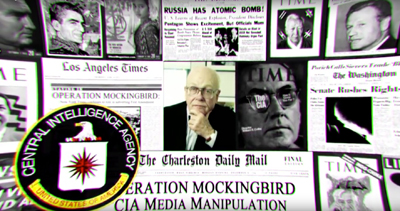Blog
Alex Gibney’s CIA Father
More documents from the FBI file

FBI documents concerning Alex Gibney’s CIA father, Frank Gibney, continue to provide further insight:
While at Life magazine, Frank Gibney’s insider status in the spy community was clear in letters made public by the CIA, including one to Director Dulles on January 5, 1960 (mistyped “1959” in the original). In that letter, Gibney requested “a sustained conversation with you alone.”
On January 9, Dulles replied, saying he “would very much like to get together with you for a good talk. The next time that I am in New York, I will make it a point to get in touch with you.” A handwritten postscript noted, “If in the meantime you are here in Washington, please let me know.”
Dulles, CIA director from 1953 to 1961, oversaw a secret agency endeavor named Mockingbird that recruited journalists and used them covertly, like the creature of that name—to chirp out intelligence again and again, and loudly.
Operation Mockingbird was exposed in 1979 by Deborah Davis in her book Katharine the Great: Katharine Graham and Her Washington Post Empire.
“You could get a journalist cheaper than a good call girl, for a couple hundred dollars a month,” Davis quoted a CIA operative as saying.
Another Gibney letter to Dulles, dated April 16, 1960, asks, “If next week is just too bad for you, could we do it sometime the following?”
What is significant about Gibney’s seemingly innocuous note was that he was just months away from publishing The Khrushchev Pattern in February 1961, aimed at scaring the American public about the Communist threat. Kirkus Reviews book review magazine summarized its contents mildly: “It is Gibney’s conclusion that Khrushchev’s superficially reasonable tactics are as terrible a threat as Stalin’s more obvious aggression.”
That same month, freshly inaugurated President John F. Kennedy wrote a cordial letter to Khrushchev, expressing his intention “to do everything I can toward developing a more harmonious relationship between our two countries.”
Gibney’s book appears to have been strategically timed to bolster his friend Allen Dulles’ Cold War plans and to torpedo hopes for dialogue, security and peace, much as a 1959 Gibney anti-Soviet screed, The Frozen Revolution, was aimed at chilling President Eisenhower’s warming relations with Khrushchev.
But Frank Gibney’s secret government propaganda masterpiece was The Penkovsky Papers, described in a 1976 U.S. Senate report that didn’t mince words as a “CIA book … prepared and written by witting Agency assets.” It purported to be the writings of Oleg Penkovsky, a colonel in Soviet military intelligence who was executed in 1963 after providing information to U.S. and British intelligence.
The “witting Agency assets” were Frank Gibney and Peter Deriabin, a Soviet defector who had been an agent of SMERSH—Soviet military counterintelligence—and the KGB. Deriabin defected in 1954 and subsequently worked for the CIA for decades, collaborating on an earlier book with Gibney, The Secret World, and retiring from the agency in 1981. As a sign of Deriabin’s sensitive status, after he died in 1992, the CIA reportedly kept the names of his family members secret. But Deriabin and Gibney, the “journalist,” worked side-by-side on at least two books.
Not everyone was fooled by the deception. Regarding The Penkovsky Papers, the Historical Dictionary of British Intelligence noted “odd passages in the book, including some rather old-fashioned phrases that made it unlikely Penkovsky had written them.”
A December 25, 1977, New York Times article noted the book was compiled by Gibney from CIA records. The Times quoted a CIA official: “It was not a diary and it was a major deception to that extent.” Another former official said the book was “cosmetized,” while a third noted the absurdity of believing that spies keep diaries in the first place. Finally, the man his son Alex describes as a “truth seeker” admitted to the Times that “the journal as such did not exist.”
Additional CIA papers refer to Frank Gibney with the comfortable familiarity of an old pair of slippers or a well-worn sofa. A March 5, 1960, memorandum, classified “Secret,” discusses a prospective propaganda piece “to be written by someone like Frank Gibney of Life.” A March 29, 1960, memo, similarly marked “Secret,” refers to “Frank Gibney, the Time Life writer who worked with Deriabin on his book.”
In the FBI interviews with former Gibney editors Max Ways and John Jessup, Ways took a swipe at the integrity of Gibney’s research, pointing out that his book The Operators “relies on unreliable statistics.”
According to information Jessup provided, Gibney “wrote a book, not signed, concerning a Russian defector, [the previously mentioned] Peter Deriabin which was originally printed in two or three installments of Life—what appears to be a textbook example of Operation Mockingbird in action. Of note, an influential figure at Time Life for many years, and Life publisher from 1960 until his death in 1964, was intelligence community heavyweight C.D. Jackson, described by Carl Bernstein as Henry Luce’s “personal emissary to the CIA.” Jackson, Bernstein reported, “approved specific arrangements for providing CIA employees with Time Life cover.”
More to come…